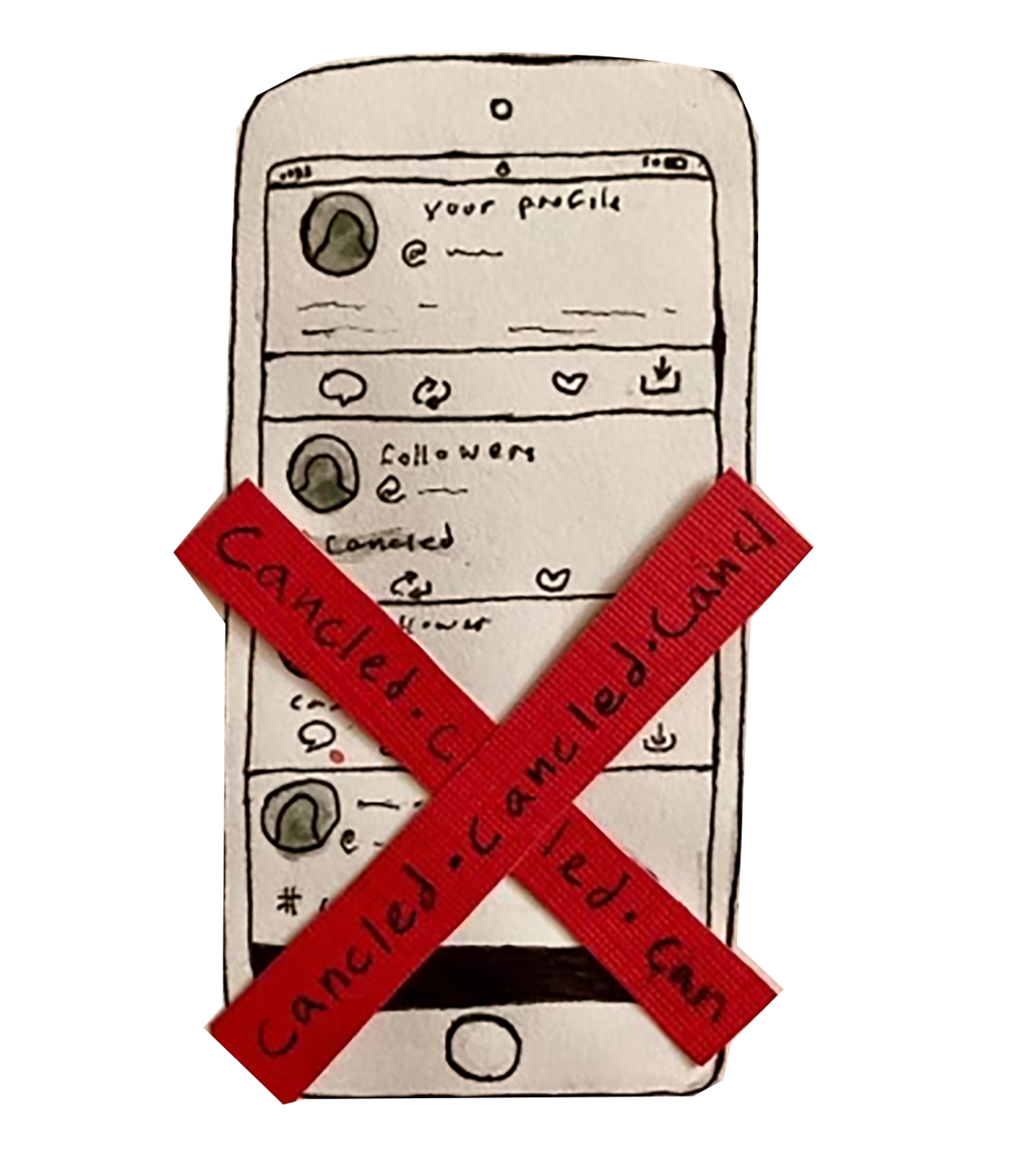The illustration shows a phone screen with someone canceling an influencer on Twitter. While it is an important tool for regulating celebrities’ and influencers’ behavior on social media, canceling should be reserved for extreme and destructive behavior in order to be effective. Illustration by Frances Thrasher
The act of holding public figures accountable is important, but its purpose is lost when celebrities and social media influencers are canceled for trivial reasons.
The primary purpose of canceling should be to combat abusive behavior and wrongdoings of influencers and celebrities in order to stop them from perpetuating harmful actions, but the culture that often surrounds it can completely miss the mark by targeting the wrong people.
Shunning has been a powerful mechanism throughout human evolution to enforce behavioral norms and limit harm, as the fear of being shunned is meant to be a deterrent to harmful behavior. For example, a caveman who ate all of his tribe’s food would have been cast out from the group without any resources to survive.
For social media influencers, the loss of reputation can be just as significant. Canceling — the modern-day, widespread form of shunning — takes away an influencer’s connection to their audience, which for many supports their livelihood. This is intended to force them to change their poor behavior for the better.
“Canceling — the modern-day, widespread form of shunning — takes away an influencer’s connection to their audience, which for many supports their livelihood.”
YouTuber Shane Dawson experienced one of the highest-profile cancellations of 2020. According to a June 2020 article in The Washington Post, the controversies included sexualizing children and animals, wearing blackface and using racial slurs in his videos.
The Washington Post also reported that YouTube demonetized his content following the cancellation. According to Social Blade, which shows social media analytics for creators, Dawson’s subscriber count also declined between June and November 2020, from 23.3 to 21.2 million people.
After an extensive break from social media, Dawson continues to limit his internet presence in order to reflect on his decisions and ensure they are not repeated.
This is an example of cancel culture doing its job. Dawson’s behavior was problematic and severely harmful to his large audience, thus he was immediately condemned, restraining his impact on the public and minimizing his platform online.
Canceling only serves its purpose when used intentionally and against someone who is causing harm to the public, but it has spun into a toxic culture.
“Canceling only serves its purpose when used intentionally and against someone who is causing harm to the public, but it has spun into a toxic culture.”
Instead of serving as a means to end a career, it has instead become the end itself.
Singer-songwriter Demi Lovato has been canceled time and time again, even meriting her very own semi-permanent Twitter hashtag, #DemiIsOverParty. In March 2020, Instagram users shunned Lovato for posting foul comments about singer-songwriter Selena Gomez on a private account.
While Lovato’s remarks were certainly in poor taste, this issue did not affect the public enough to warrant another cancellation.
Similarly, social media users went after singer-songwriter Taylor Swift on Twitter in March 2021 for a situation she had virtually no control over. Fans flooded the comments of one of her ex-boyfriend’s social media posts with negative comments on his and Swift’s breakup, which prompted the ex’s fans to use the hashtag #TaylorSwiftIsOverParty to call out the singer for her toxic behavior.
Audiences should recognize the difference between Swift’s situation and Lovato and Dawson’s behavior. People should be called out for disrespectful actions, like Lovato, but true shunning should be reserved for the small number of extreme cases, like Dawson, lest canceling loses all meaning.
“Audiences should recognize the difference between Swift’s situation and Lovato and Dawson’s behavior.”
Social media platforms attempt to ward against harmful behavior by screening for the most dangerous messages and suppressing them. Facebook, Twitter, Instagram and TikTok implement automatic filters that identify and block content deemed to be harmful, such as drugs or weapons.
However, the collective responsibility of holding people accountable for their actions cannot be offloaded to an algorithm.
Audiences must call out influencers for their behavior when it causes public harm, and that means reserving canceling for when it’s necessary.
